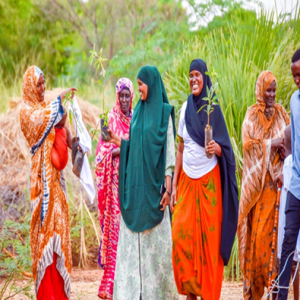March 30, 2024, marked a significant milestone for Ushindi for Women Organization as it launched a transformative tree-planting initiative under the Balambala Green Future project in Raya, Balambala Sub-County. This initiative focuses on empowering the local farming community through climate-resilient agriculture and environmental conservation. By addressing the challenges posed by climate change, the project aims to enhance the livelihoods of farmers who depend entirely on agriculture while fostering sustainable practices.
The event saw farmers planting bamboo, mango, and lemon trees along the riverbank, a crucial step toward improving both environmental and economic resilience. Alongside the tree planting, Ushindi conducted training sessions on sustainable farming techniques, promoting crop diversification and raising awareness about the importance of adapting to changing environmental conditions. Thirty participants, equally split between men and women, took part in the initiative, highlighting Ushindi’s commitment to inclusivity and gender equity.

The project delivered impactful results, with 61 seedlings—comprising 32 mango, 25 lemon, and 4 bamboo trees—distributed to farmers. These trees not only hold potential for future food and income sources but also contribute to protecting the riverbank from erosion. The distribution was carefully tailored to match each farm’s specific conditions, ensuring the successful implementation of sustainable agroforestry practices. Farmers also received training on proper planting techniques, empowering them to optimize the benefits of these resources while contributing to environmental sustainability.
In partnership with Garissa Million Trees, a renowned ecosystem restoration initiative, Ushindi ensured that the selected tree species were well-suited to the local climate and soil conditions. The collaboration emphasized the importance of technical expertise in driving successful environmental projects. Beyond the immediate benefits, this initiative positions farmers as active participants in combating climate change. By adopting agroforestry practices, they are not only safeguarding natural resources but also building resilience against climate shocks.

During the launch, farmers expressed a need for additional support, including the provision of grass seeds to complement integrated farming approaches and capacity-building sessions on advanced farming techniques to improve land utilization and crop yields. Ushindi for Women plans to expand its climate resilience initiatives in Balambala, with plans to establish a farmer-led climate change network in Sankuri and continue promoting sustainable resource management for future generations.
The Balambala Green Future project exemplifies the power of community-driven solutions in addressing climate challenges while fostering economic opportunities. Ushindi for Women is paving the way for a brighter, greener future for the Raya community and beyond by combining environmental stewardship with sustainable livelihoods.